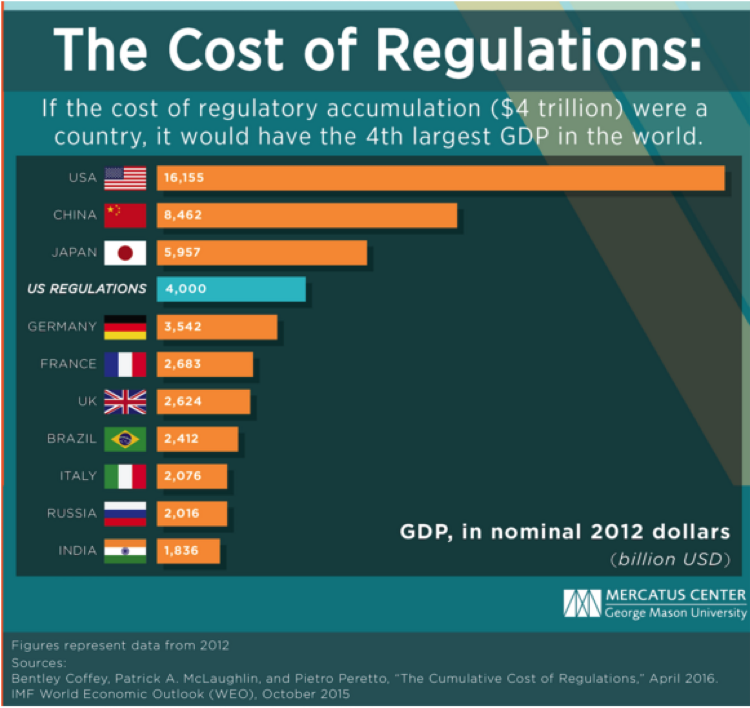 Federal regulations are often a complex cobweb of repetitive, useless rules determined by federal bureaucrats rather than elected officers. These regulations may have good intentions of providing clean water, increasing public safety, and other benefits, but it’s important to consider the costs of those measures. Far too often, government avoids considering these costs that are detrimental to everyone’s well-being. It’s no secret that big government restricts the economy, but by how much? According to a new study by the Mercatus Center, federal regulations that have accumulated from 1980 to 2012 cost Americans approximately $4 trillion! Figure 1 shows that this huge cost translates into about 25 percent of the U.S economy, $13,000 per American, or the fourth largest economy in the world. Clearly, Americans are being stifled by too much red tape. Figure 1: Federal regulations have hindered economic progress to the tune of $4 trillion since 1980. The study’s findings show that federal regulations have reduced average U.S. economic growth by about 0.8 percentage points per year since 1980. While this doesn’t seem like a big deal, it’s important to note that economic growth compounds over time. Therefore, the negative gap between economic growth without regulations compared with actual growth grows larger as it builds on itself each period. Mercatus has the federal regulation and state enterprise (FRASE) index that ranks the economic impact of federal regulation on states. Texas ranks as having the 6th highest, or the state’s industries are negatively influenced 29 percent more than the national average. This is a huge cost to Texans as noted in Figure 2 with the tremendous number of federal regulations on businesses. The cost of federal regulation on Texas is not only burdensome at the federal level. States also plague their businesses with burdensome regulation. Texas' successful economic model is one that other states and federal lawmakers would be wise to follow, but even Texas could do far better when it comes to regulation. In the Mercatus Center’s Freedom in the 50 States report, Texas ranks only 24th for regulatory freedom. One reason is stringent occupational-licensing requirements; the Institute of Justice ranks Texas as having the 17th most burdensome set of them. These regulations protect existing businesses from new competition and make it harder for low-skilled workers to find employment, making everyone losers in the process. To have the best economic environment for opportunities to prosper and higher standards of living, regulation at the federal and state levels should be dramatically scaled back. The cost of every regulation must be considered, and those that have a higher cost than benefit should be scrutinized and ultimately not imposed. This is how we can begin to reclaim the American Dream for far too many who feel as though it is out of reach.
0 Comments
Leave a Reply. |
Vance Ginn, Ph.D.
|

 RSS Feed
RSS Feed